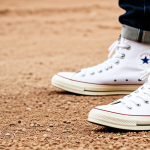Unveiling Athlete Mindsets: Distinct Psychological Approaches in Individual and Team Sports
When it comes to sports, the mental game is just as crucial as the physical one. Athletes, whether in individual or team sports, rely heavily on their psychological mindset to perform at their best. In this article, we will delve into the distinct psychological approaches that differentiate individual and team sports, and how these approaches impact performance, mental health, and overall success.
The Role of Sport Psychology in Athlete Performance
Sport psychology focuses on the mental factors that contribute to performance in athletics. Key concepts include mental resilience, focus, motivation, and the ability to manage stress and anxiety[3].
Also read : Boosting cricket excellence: how wearable tech transforms real-time strategies
Goal Setting and Mental Preparation
One of the fundamental psychological tools in sports is goal setting. Athletes in both individual and team sports benefit from setting clear, achievable goals. However, the way these goals are set and managed can vary significantly between the two.
In individual sports, athletes often set personal goals that are highly specific and measurable. For example, a sprinter might aim to shave off a certain number of seconds from their personal best time. This goal-setting process is highly individualized and focuses on the athlete’s personal performance metrics.
Also to read : Designing a customized post-elbow surgery recovery plan for baseball pitchers: an in-depth resource
### Example of Goal Setting in Individual Sports
- **Specific Goal**: Reduce 100-meter dash time from 10.5 seconds to 10.2 seconds.
- **Measurable Steps**:
- Increase sprint training sessions to 4 times a week.
- Incorporate strength training to improve power.
- Use mental imagery to visualize successful races.
- **Achievable Timeline**: Achieve the goal within the next 6 months.
In team sports, goals are often more collective and aligned with the team’s overall strategy. For instance, a soccer team might aim to win a certain number of games in a season or to improve their defensive record. Here, the goals are set with the team’s performance in mind, and each player’s individual goals are aligned to support the team’s objectives.
### Example of Goal Setting in Team Sports
- **Specific Goal**: Win at least 15 games in the upcoming season.
- **Measurable Steps**:
- Increase team practice sessions to focus on defensive strategies.
- Improve communication among players during games.
- Analyze past games to identify and correct mistakes.
- **Achievable Timeline**: Achieve the goal by the end of the season.
Mental Health and Therapy in Sports
Mental health has become a critical aspect of sports psychology, with many athletes seeking therapy to enhance their performance and overall well-being.
Benefits of Therapy for Athletes
Therapy can address several key areas that impact an athlete’s performance and mental health:
-
Mindset: Therapy helps athletes manage negative self-talk, develop positive affirmations, and cultivate a healthier mindset. This is particularly important for athletes who struggle with self-confidence and performance anxiety[2].
-
Goal Setting: Therapists can help athletes break down long-term goals into smaller, manageable steps, fostering self-compassion and mental resilience when faced with setbacks[2].
-
Identity: For athletes deeply invested in their sport, therapy can help them explore other aspects of their identity, leading to a more balanced life and greater life satisfaction[2].
-
Emotional Regulation: Athletes often experience a rollercoaster of emotions. Therapy can help them regulate these emotions, manage stress, and improve their overall mental stability[2].
-
Relationship Dynamics: Therapy provides a confidential space for athletes to discuss their relationships with teammates, coaches, and family members, helping them improve communication skills and set healthy boundaries[2].
-
Self-Care & Holistic Wellness: Therapists can help athletes prioritize self-care by examining their sleeping patterns, eating habits, and other wellness areas, creating a self-care toolbox to support their overall health[2].
Cognitive Behavioral Approaches
Cognitive behavioral therapy (CBT) is a powerful tool in sports psychology, helping athletes to identify and change negative thought patterns that affect their performance.
Cognitive Behavioral Techniques in Individual Sports
In individual sports, CBT can be highly personalized. For example, a golfer struggling with anxiety might use CBT to identify and challenge negative thoughts that arise during competition. Here are some techniques:
- Mindfulness Based Interventions: Athletes learn to be present in the moment, focusing on their breath and physical sensations to reduce anxiety and improve focus.
- Mental Imagery: Athletes visualize successful performances to build confidence and prepare mentally for competitions.
- Positive Self-Talk: Athletes replace negative self-talk with positive affirmations to boost self-confidence and performance.
Cognitive Behavioral Techniques in Team Sports
In team sports, CBT can be adapted to address team dynamics and collective mental health. Here are some approaches:
- Team Mindfulness Sessions: Coaches can organize mindfulness sessions for the entire team to improve collective focus and reduce stress.
- Group Goal Setting: Teams set collective goals and work together to achieve them, fostering a sense of unity and shared purpose.
- Conflict Resolution: CBT can help team members manage conflicts and improve communication, leading to a more cohesive and supportive team environment.
Stress Management and Anxiety
Stress and anxiety are common challenges for athletes in both individual and team sports. Effective stress management is crucial for maintaining peak performance.
Training as You Would Compete
One of the key strategies for managing stress and anxiety is to “train as you would compete.” This means applying the same focus and intensity in training as in competition. As Leading Australian swimming Coach Lawrie Lawrence once said, “Nothing gives an athlete confidence like knowing they have done everything they possibly could have done to their best of their ability in training and preparation”[1].
Table: Comparing Stress Management Techniques in Individual and Team Sports
| Technique | Individual Sports | Team Sports |
|---|---|---|
| Mental Imagery | Personalized visualization of successful performances | Collective visualization of team success |
| Positive Self-Talk | Individual affirmations to boost self-confidence | Team affirmations to foster unity and confidence |
| Mindfulness | Individual mindfulness sessions to reduce anxiety | Group mindfulness sessions to improve collective focus |
| Goal Setting | Personal goals aligned with individual performance metrics | Collective goals aligned with team strategy |
| Training Intensity | High-intensity training to simulate competition stress | High-intensity team training to simulate game scenarios |
Social Support and Team Dynamics
Social support is a critical factor in the psychological well-being and performance of athletes.
The Importance of Social Support in Individual Sports
In individual sports, athletes often rely on their coaches, family, and friends for social support. Here are some ways social support impacts individual athletes:
- Coaches: Provide technical guidance and emotional support.
- Family and Friends: Offer emotional support and encouragement.
- Mentors: Share experiences and provide guidance on managing stress and performance pressure.
The Importance of Social Support in Team Sports
In team sports, social support is even more multifaceted. Here are some key aspects:
- Team Camaraderie: Team members support each other emotionally and physically, creating a cohesive unit.
- Coaches and Trainers: Provide both technical and emotional support, helping players manage stress and improve performance.
- Fans and Community: External support from fans and the community can boost morale and motivation.
Injury and Recovery
Injuries are a common risk in sports, and the psychological impact can be significant.
Psychological Approaches to Injury Recovery
When athletes suffer an injury, their mental health can be affected in several ways:
- Anxiety and Depression: Athletes may experience anxiety about returning to competition or depression due to the loss of their sport.
- Identity Crisis: Injured athletes may struggle with their identity outside of their sport.
- Rehabilitation Motivation: Maintaining motivation during the rehabilitation process is crucial for a successful recovery.
Therapy can play a vital role here by helping athletes manage these psychological challenges. Techniques such as cognitive behavioral therapy, mindfulness, and positive self-talk can help athletes stay motivated and focused during the recovery process.
The psychological mindset of athletes is a complex and multifaceted aspect of their performance. Whether in individual or team sports, understanding and managing mental health, setting effective goals, and leveraging cognitive behavioral techniques are essential for achieving success.
As a wise coach once said, “Attitudes are contagious – is yours worth catching?”[1]. By adopting the right mindset and psychological approaches, athletes can not only improve their performance but also enhance their overall well-being.
In the words of Leading Australian swimming Coach Lawrie Lawrence, “Nothing gives an athlete confidence like knowing they have done everything they possibly could have done to their best of their ability in training and preparation”[1]. This confidence, built through consistent training, goal setting, and mental preparation, is the cornerstone of a winning attitude in sports.
By integrating these psychological approaches into their training and daily lives, athletes can unlock their full potential, manage stress and anxiety, and achieve greater success in their respective sports.




